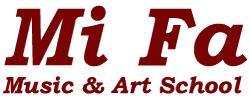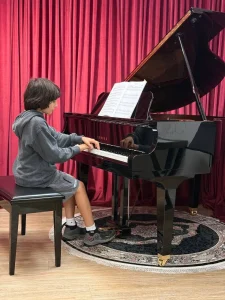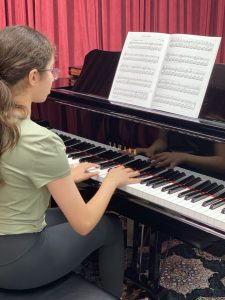All parents want the best for their children. Many of them ask themselves: What is the main benefit if I register my infant for a music class? Would they become a professional musician in the future if they started earlier? What is the best age to learn music, and does starting young really make a lasting difference?
Music Learning Starts from the Very Beginning
The benefits of music and hearing ability begin even before birth. Studies show that babies in the womb respond to classical music such as Beethoven. This proves that the music journey age starts from the earliest stages of life.
From infancy, simple exposure to rhythm, melody, and singing helps lay the foundation for musical growth.
What Is the Right Age to Start Music Lessons?
Research suggests there is a “window of opportunity” between the ages of 3 and 9 when a child’s natural musical sensibility develops. During this stage, the cognitive functions that allow children to recognize rhythm, pitch, and melody are formed.
That said, there is no single “best age.” The right time depends on:
- Physical readiness (e.g., hand size for piano, arm length for cello).
- Attention span (ability to focus for 20–30 minutes).
- Interest and motivation (choosing an instrument they enjoy).
First Viewpoint: Start as Early as Possible
Some parents believe children must start lessons as toddlers to build a lifelong relationship with music. While formal training isn’t necessary that early, exposure to music from infancy helps children:
- Recognize beats and melodies.
- Develop a preference for certain sounds or instruments.
- Build creativity and confidence.
At this stage, music should be playful and engaging — singing, dancing, clapping games — rather than structured theory.
Second Viewpoint: Wait Until the Child Can Decide
Around preschool age (about 5 years old), children start to show greater awareness of music. At this age:
- They can choose their preferred instrument.
- They have the physical strength for larger instruments like the cello or bass.
- They are more likely to commit to practice since they’ve been part of the decision-making.
This viewpoint emphasizes letting the child’s interest lead the way.

Benefits of Music in Early Childhood
Early music activities do more than nurture musical skills — they build self-regulation, an important part of brain development. Strong self-regulation helps children manage emotions, focus attention, and improve memory.
Structured informal activities such as storytelling, action songs, rhythmic games, and parent-infant music sessions can significantly enhance these skills.
Best Age to Learn Music and Instruments
While the best age to learn music overall is between 3 and 9, each instrument has its own ideal starting age.
Best Age to Start Piano Lessons
The best age to start piano lessons is usually between 5 and 8, when children have finger strength and focus. Younger children can still explore keyboards through fun activities before formal training begins.
If you’re located locally and ready to begin, our piano lessons Vancouver
programs provide age-appropriate training that helps children build strong musical foundations from the very first lesson.
Best Age to Start Violin Lessons
The best age to start violin lessons is between 3 and 6. Smaller violins make it possible for very young learners, especially with parental support in methods like Suzuki.
Best Age to Start Guitar Lessons
The best age to start guitar lessons is 6–9, when children can comfortably press strings. For younger learners, ukuleles or small guitars are excellent stepping stones.
Best Age to Start Singing or Voice Lessons
For singing lessons, formal training is best around ages 7–9, when children can focus on breathing and pitch. However, informal singing can (and should) begin as early as possible.
Best Age to Start Cello Lessons
Children can begin cello lessons around ages 6–7, when their arms are long enough to handle a small cello comfortably.
Tip: Every child develops differently. Always consult with a qualified teacher before committing to lessons.
Is It Ever Too Late to Start Learning Music?
It’s never too late. While early childhood offers certain advantages, countless musicians begin later and still achieve great skill. Music provides joy and benefits at every age, from early childhood to adulthood.
What Is the Best Age to Start a Music Career?
For those aiming for a music career, starting lessons early builds a strong foundation. But passion, practice, and persistence are more important than the exact age. Many famous singers, pianists, and guitarists began in their teens or even later and still found success.
FAQs About Music and Age
- At what age can kids start music lessons?
Informal lessons can start at 6 months; formal lessons often begin around age 5.
- What age is best to start piano lessons?
Between 5–8 years old.
- What age is best to start violin lessons?
Between 3–6 years old, using small violins.
- What is the best age to start singing lessons?
Formal lessons from 7–9 years; informal singing anytime.
- Is there a bad age to start music lessons?
No — music can be learned and enjoyed at any age.
Conclusion
In summary, the golden age for music lessons is between 3 and 9 years old, but exposure can start much earlier — even in infancy. The right time depends on your child’s readiness, interest, and chosen instrument. It is never too late to start, and the joy of music is lifelong.
Music Education at MiFa Music & Art School
At MiFa Music & Art School, we offer music programs tailored to different ages and stages of development:
- Parent-infant classes (6 months–5 years): Singing, movement, and rhythm activities.
- Early learners (around 5 years old): Semi-formal lessons introducing theory and instruments.
- Ages 6–9: Structured piano, violin, guitar, or cello lessons.
- Teens and adults: Advanced training inspired by Suzuki, Orff, and Kodály methods.
👉 Explore ou kid’s music classes and sign up for a free consultation with our teachers.





